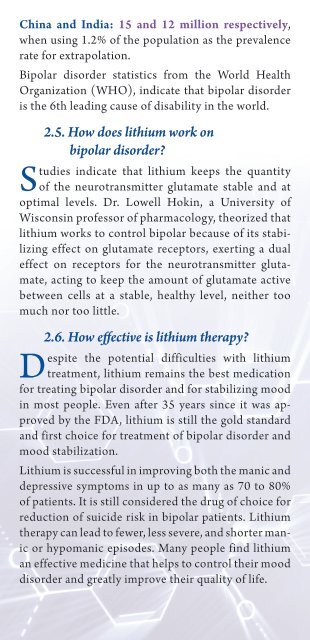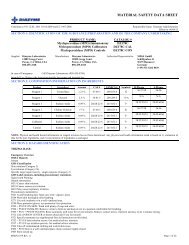Lithium test - Diazyme Laboratories
Lithium test - Diazyme Laboratories
Lithium test - Diazyme Laboratories
You also want an ePaper? Increase the reach of your titles
YUMPU automatically turns print PDFs into web optimized ePapers that Google loves.
China and India: 15 and 12 million respectively,<br />
when using 1.2% of the population as the prevalence<br />
rate for extrapolation.<br />
Bipolar disorder statistics from the World Health<br />
Organization (WHO), indicate that bipolar disorder<br />
is the 6th leading cause of disability in the world.<br />
2.5. How does lithium work on<br />
bipolar disorder?<br />
Studies indicate that lithium keeps the quantity<br />
of the neurotransmitter glutamate stable and at<br />
optimal levels. Dr. Lowell Hokin, a University of<br />
Wisconsin professor of pharmacology, theorized that<br />
lithium works to control bipolar because of its stabilizing<br />
effect on glutamate receptors, exerting a dual<br />
effect on receptors for the neurotransmitter glutamate,<br />
acting to keep the amount of glutamate active<br />
between cells at a stable, healthy level, neither too<br />
much nor too little.<br />
2.6. How effective is lithium therapy?<br />
Despite the potential difficulties with lithium<br />
treatment, lithium remains the best medication<br />
for treating bipolar disorder and for stabilizing mood<br />
in most people. Even after 35 years since it was approved<br />
by the FDA, lithium is still the gold standard<br />
and first choice for treatment of bipolar disorder and<br />
mood stabilization.<br />
<strong>Lithium</strong> is successful in improving both the manic and<br />
depressive symptoms in up to as many as 70 to 80%<br />
of patients. It is still considered the drug of choice for<br />
reduction of suicide risk in bipolar patients. <strong>Lithium</strong><br />
therapy can lead to fewer, less severe, and shorter manic<br />
or hypomanic episodes. Many people find lithium<br />
an effective medicine that helps to control their mood<br />
disorder and greatly improve their quality of life.<br />
2.7. How often is lithium taken?<br />
<strong>Lithium</strong> carbonate (Li2CO ) is the most common-<br />
3<br />
ly used pharmaceutical form of lithium. It is formulated<br />
in tablet form and administrated orally.<br />
<strong>Lithium</strong> tablets are normally<br />
taken as a single dose at night as<br />
this is more convenient and reduces<br />
the problems with some of<br />
the side effects. <strong>Lithium</strong> is usually<br />
taken for one to two years to<br />
<br />
derive full benefit from its use.<br />
Many people need to stay on it long-term to prevent<br />
the illness from relapsing.<br />
When initiating lithium therapy, dosage must be individualized<br />
according to serum levels and clinical<br />
responses.<br />
For Acute Mania: Optimal patient response can usually<br />
be established and maintained with 1,800 mg per<br />
day. Such doses will normally produce the desired serum<br />
lithium level ranging between 1.0 and 1.5 mM.<br />
For Long-Term Control: The<br />
desirable serum lithium levels<br />
are 0.6 to 1.2 mM. Dosage will<br />
vary from one individual to another,<br />
but usually 900 mg to<br />
1,200 mg per day will maintain<br />
this level. Serum lithium levels<br />
in uncomplicated cases receiving maintenance therapy<br />
during remission should be monitored at least<br />
every two months.<br />
2.8. What are the side effects of lithium<br />
therapy?<br />
• dry mouth<br />
• a metallic taste<br />
• slight tremor<br />
• a feeling of mild weakness<br />
• loose bowel movements<br />
(diarrhea)








